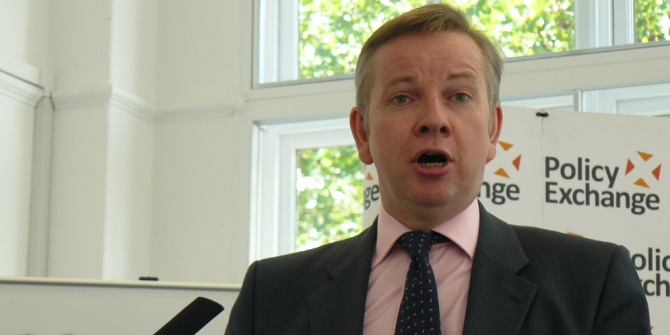 The free schools policy championed by Michael Gove is experiencing a serious failure of implementation. Meanwhile, the political response in challenging and holding to account those responsible has been feeble. Many of these difficulties could have been foreseen had the initial legislation been properly scrutinised, writes Mark Goodwin.
The free schools policy championed by Michael Gove is experiencing a serious failure of implementation. Meanwhile, the political response in challenging and holding to account those responsible has been feeble. Many of these difficulties could have been foreseen had the initial legislation been properly scrutinised, writes Mark Goodwin.
After four reasonably harmonious years of coalition, recent events have raised the possibility that it could be either free schools or free school meals that finally undo the marriage of convenience between Conservatives and Liberal Democrats. The revelation that £400 million had been diverted from maintained schools to shore up the Conservatives’ faltering free schools initiative was leaked to the press by a senior government source. The immediate counter-attack saw Nick Clegg’s proposal to provide free school meals for primary children savaged by Conservatives including Michael Gove’s former special adviser Dominic Cummings.
These two stories were widely reported as examples of intra-coalition tension, as each party seeks to carve out a distinct position in the run up to elections both this year and next. Yet as media attentions shifted to UKIP and the European elections, and Gove and Lib Dem schools minister David Laws were required to kiss and make up by their respective party managers, these skirmishes can be seen to reveal a more fundamental problem. Coalition schools policies are experiencing serious failures of implementation, and the political response in scrutinising, challenging and holding to account those responsible has been feeble. In its demonstration of the ability of the executive to impose and sustain under-developed policy with minimal opposition, schools policy shows British politics at its least effective.
Since 2010, the locus of policy-making for schools has shifted from the units around the prime minister to the secretary of state, but much of the substance remains unchanged. The SpAds who developed New Labour schools policy shared with Gove the understanding of their role as not mere stewards or managers of England’s 20,000 state-funded schools, but as agents of radical, disruptive change. Likewise, Gove has committed himself to providing the same central driving force that once came from edu-wonks such as Andrew Adonis and Michael Barber. The upshot of nearly 20 years of this top-down approach to reform has been a massive transfer of power towards the centre of government, with over half of all secondary schools now directly under the control of the secretary of state. While supporters of new school types such as academies and free schools often emphasise their autonomy, the reality is that the schools system has now shifted decisively from being a national system, locally administered to being a national system, nationally administered.
The principle of self-managing centrally-directed schools has been decisively established and is now shared by all the mainstream parties. While Gove and former schools minister Nick Gibb might fantasise about fighting a David and Goliath battle against ‘the Blob’– a shadowy cabal of university education professors, Marxists, union leaders and local authority officials – the reality is that there is no serious opposition to the structural reforms that the coalition has inherited and massively accelerated since 2010. Despite their past support for localism and history of opposition to academies, Liberal Democrats have been prevented from mounting any convincing challenge to the extensive reform programme initiated by Gove due their participation in coalition. Instead, they have been forced to make unconvincing attempts to differentiate their position from their coalition partners through rather fragile-looking policies at the margins, hence the free school meals pledge. Labour, not yet ready to disavow the Blairite legacy in promoting new school models, have been unable to stake out a tenable position, with three shadow education secretaries already seen off and a fourth described, with some justification, by Gove as having positions on free schools “more contorted than some Indian sex manuals I could name”.

Yet this is not simply a matter of parties converging on policy positions. The fact is that the implementation of coalition schools policy, particularly on free schools, has so far been disastrous. The legislation that introduced free schools and allowed for the massive expansion of academies (from 203 secondary academies in 2010 to 1886 in May 2014) was rammed through parliament in 5 days and the failure of that legislation to receive proper scrutiny is clearly beginning to tell on the front line. One third of free schools inspected by OfSTED have been found to be inadequate or requiring improvement. Overall, 45 Ofsted reports on free schools have so far been published, of which seven were outstanding, 23 good, ten required improvement and five inadequate. Both the National Audit Office and the Public Accounts Select Committee have criticised the financial management of the free schools programme.
Free schools have been found to be a wholly inadequate solution to increasing pressure on primary school places, with many opening in regions with existing surpluses, while half of the areas facing severe pressure on places have no free schools and have received no applications to open any. High profile failures such as the Al-Madinah school in Derby, found to be inadequate in every category by OfSTED and subsequently closed down, and the Discovery New School in Crawley, closed due to poor performance after a £3 million initial outlay have exposed fundamental weaknesses in the applications procedure, in the support available to failing schools and in the provision allowing unqualified staff to teach in academies and free schools.
Many of these difficulties could have been foreseen had the initial legislation been properly scrutinised. In a 2012 education select committee hearing, Gove was asked 14 consecutive questions about the processes for intervening in failing academies and free schools. Besides criticising the record of local authorities on school improvement, he was unable to provide an answer. The lack of attention to these issues has clearly come home to roost in the case of Al-Madinah and others. Even the secretary of state is beginning to acknowledge the need for some remedial action , introducing Regional Schools Commissioners in an attempt to stop the rot and in recognition of the fact that the very rapid increase in the number of schools under direct central government control has exceeded the DfE’s management capacity.
The announcement of an intermediate tier of management comprising Regional School Commissioners is a partial response to these failures, but many of the weaknesses of the free schools programme have still faced minimal challenge from opposition parties and parliament. It has been left to education blogger Laura McInerney, for example, to wage a one-year ongoing battle with the Department for Education to release information vital to proper scrutiny of the organisations bidding to receive public money for running free schools.
Yet while recent events have increased the pressure on the free schools policy, and despite the secretary of state’s strong personal commitment to the troubled programme, it seems likely Gove will continue to weather the storm. New Labour’s academies programme faced strong opposition in its early years, including widely-reported failures, some with striking similarities to the Al-Madinah case. Yet that school model is now the default for secondary schooling in England, despite the fact that the efficacy of academies in raising standards was never decisively demonstrated. Gove seems at present to be almost impervious to criticism, continuing to enjoy strong support from his own party and ineffectual opposition from others. If he survives in post until the next election, he will be the longest-serving education minister since the post was founded. Whether this speaks more to a record of unalloyed success, or to a lamentable failure of proper scrutiny and challenge elsewhere in the system is an open question.
Note: This article gives the views of the author, and not the position of the British Politics and Policy blog, nor of the London School of Economics. Please read our comments policy before posting. Image credit: Policy Exchange







